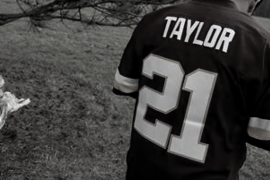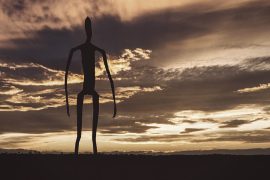AS THE BUS AMBLED THROUGH RUSH HOUR, Penny looked at the ticket she picked up from the ‘free’ table at work. That last-minute decision, plus traffic, made her late so when she stepped off the bus in Levi’s Plaza, the street was empty. Penny closed her eyes. She breathed in the mist and the slight briny smell of the bay, remembering that the theater was in an old icehouse, built before refrigeration. This area of San Francisco had been built, burned, and rebuilt so many times, covering up but not erasing its vivid history. She could feel, ever so slightly, the vibrations of the years around her.
The theater door opened as Penny reached for it. A gray-haired man and woman rushed out, the man swearing while the woman shushed him. Penny walked into the musty lobby where an usher raised her cane to block the path.
“You’re too late. It’s beginning.”
“I’m sorry, please, but,” Penny begged. “It would be a shame not to support the show.”
The usher grumbled but took Penny’s ticket and led her into the darkness, stopping at a seat on the aisle. Penny couldn’t see anyone but felt the closeness of the audience. She shivered. Unable to read the playbill in the dark, she had no warning that, when the spotlight came on, the stocky, dark-haired man standing alone on stage was wearing nothing but black dress socks.
Penny didn’t know what to do. She tried not to stare at the naked man but there wasn’t anything else on stage to look at but a hard-backed chair. Maybe it was a joke to make a fool of the audience, an absurdist play to see who would laugh first.
A citrusy scent, maybe from perfume or an air freshener, clogged her senses, making her lightheaded. When the other character, a woman named Emma, walked on stage fully clothed, she didn’t seem to notice the man’s nakedness. Penny waited for them to acknowledge it but they didn’t and after the third scene, Penny slipped out of her seat, leaving her program behind. The usher called after her as she burst through the door into the chilly night.
On the bus to her apartment, Penny felt prudish to be that embarrassed by a man’s nudity. She thought of the couple that left as she arrived. She looked up the play, Last Bus to Stonehenge, on her phone and bought a ticket for the next night’s performance.
Penny didn’t invite anyone to join her. She wasn’t close to her coworkers. She heard them go to lunch in various pairs and trios, but after she turned them down a few times, they stopped asking. She worked well with them on projects but the idea of manufacturing small talk was exhausting. With her few friends, she had regular activities: movies with Lauren, Sunday yoga with Melissa. She joined Rebecca, her cousin in the East Bay, for flea markets and concerts. Rebecca also invited Penny to spend every holiday with her family and sometimes Penny accepted.
***
Walking into the theater on Friday night, after a quick nod at the usher, Penny was surprised to find herself seated in the front row. She must have turned the room around in her head when she bought the ticket. She consulted the program—the play had three acts, one location, and two characters: Pedro and Emma.
When the spotlight came up on Pedro, he stood still, waiting, like there was no one else in the room. The middle-aged man seated next to Penny said, “You’ve got to be kidding me,” and stood up. He reached for the hand of his date, who was staring at Pedro. She glanced over at Penny before sighing and taking the man’s hand. Penny heard laughter from the crowd as they left. When Pedro began to speak, Penny felt a strange energy, like buzzing from a neon sign, and thought about how long it had been since she saw a man naked.
Her last date didn’t get that far. Lauren had set Penny up with a finance guy, Colin, she knew from work. They decided to go out to dinner and if that went well, see a movie. He made reservations at a fusion restaurant in Pac Heights and ordered a bottle of wine without asking what Penny liked. After she ordered her meal, Colin asked the server to pick his meal for him. He said there wasn’t a food he wouldn’t eat and liked to be surprised. Penny was embarrassed for him but wasn’t sure why.
“I’ll eat anything,” Colin said, after tasting and approving the wine Penny knew she wouldn’t like.
“But don’t you know what you want?”
“I know what I want,” he said, “but I don’t know what I don’t know, see? If I always eat the same thing, how will I ever try anything new?”
Penny couldn’t disagree but was still put off by Colin’s garrulous manner—talking so much but saying nothing. As he paid the check, waving away Penny’s offer to split it, she said that she felt a migraine coming on, perhaps from the tannins in the wine, and was going to go home. She hadn’t heard from him since.
At the first scene change, Penny left her seat. She was too close, too exposed, to Pedro’s nakedness to feel comfortable. Seeking refuge in the empty lobby, she wondered who was naked: the actor or the character. It would be different if Pedro was clothed and the other characters pretended he was naked. Or they were all naked. Penny stepped outside, confused, letting the air cool down her flushed face.
She shivered as she waited for the bus, imagining going to the show with Colin. He’d probably whisper throughout the play, explaining the subtext to her. She opened the phone app and purchased a ticket for Saturday night, double checking it was not in the front row, so she could ignore Pedro and give her full attention to the story.
***
“You’re here again.” It was a statement, not a question, from the same usher who was there the first night. “Staying for the whole play this time?”
Penny blushed. “Had an emergency.”
“Sure, honey,” the woman said as Penny disappeared into the nearly full theater.
She scooted past a few people to reach the center seat of the middle row. There was a different energy emanating from that spot, like when a plane begins to descent. She yawned to pop her ears. She thumbed through her well-worn program to read the description of the theater again. The extra-thick walls and floors sloped slightly toward the center to let the melting ice drain into the ground beneath. The drain had probably been—maybe it still was—right under her seat.
This time, Penny concentrated on Pedro’s face so she could follow the story. Pedro was from Mexico and Emma was from Texas. They were vacationing in England and now arguing about visiting Stonehenge on their last day. Emma had dreamed of seeing Stonehenge since she played princess and dragons. Pedro was sure she’d be disappointed.
“Remember Big Ben,” he said. “We waited in line for so long. And for what?”
“But Stonehenge is an energy vortex—”
“Not this again.”
“It’s a convergence of all ley lines around the world. They say the area has healing powers. Just by being there. Like the pyramids in Egypt and the Mayan ruins in Mexico.”
“But you never want to go to Mexico, do you?”
Penny’s thoughts drifted to an article she’d read dismissing the idea of ley lines and spiritual vortices. The writer didn’t call them hoaxes exactly but implied people who believed in them were gullible at best and stupid at worst. An old Vermont hippie was quoted as saying that ley lines were what humans—and in turn, the earth—inherited and passed on when connections were made between people, over time, through experience. Penny didn’t understand how someone could disagree that different places had different energy.
She spent so much time thinking about Stonehenge and ley lines that the curtain had come down before she focused back in. Penny stopped at the box office and bought a ticket to the next day’s final performance.
***
For the matinee, Penny’s seat was in the back row. Here it felt cold, even a dead spot, maybe a draft from the emergency exit. She imagined the old workers moving giant blocks of ice on and off carriages, maybe slipping ice chips to the horses now and then.
“Okay,” Emma was saying on stage. “We’ll go to Mexico next, but let’s go to Stonehenge today.”
“Do you think we can catch the last bus?” Pedro asked.
“If we hurry,” Emma said. “Just let me get ready.” She pulled off her white T-shirt, used it to wipe off her bright pink lipstick, and dropped it to the floor. Then she took off her jeans. As she reached back to unhook her bra, the stage lights dimmed.
Penny gasped and looked around. Over her shoulder, she caught a man’s eye before he turned and whispered to the man next to him. The curtain lowered and the audience clapped. Penny stood up but didn’t clap. She wanted to rush into the street and grab the first person she saw and shout, let me tell you about what I just saw.
When the house lights were raised, the actors came out wearing robes. They were joined on stage by the director for a question-and-answer session. Penny left before the first question was asked. She didn’t know much about art but she knew she didn’t want to hear it explained. Not by Colin, not by the director.
There wasn’t anyone on the street for Penny to talk to. She was bursting with thoughts and feelings, but just one that she kept circling back to. The next time she had a date, she would insist that they go to a museum or a play or a poetry reading. Any kind of art, she thought, would help her connect, for better or worse, with the other person and leave her feeling something other than emptiness at the end of the night.
JEN McCONNELL is a fiction writer and poet, with work recently appearing in the tiny journal, Red Rock Review, Santa Fe Literary Review, Paragraph Planet, Sequestrum, The Disappointed Housewife, and more. Her first short story collection, “Welcome, Anybody,” was published by Press 53, and she’s currently finishing her second. Her work has twice been nominated for a Pushcart Prize. She currently serves as Fiction Editor for The Bookends Review. Read more at jenmcconnell.com.
Like what you’re reading?
Get new stories, sports musings, or book reviews sent to your inbox. Drop your email below to start >>>
NEW book release
Ghosts Caught on Film by Barrett Bowlin. Order the book of which Dan Chaon says “is a thrilling first collection that marks a beginning for a major talent.”
GET THE BOOK



